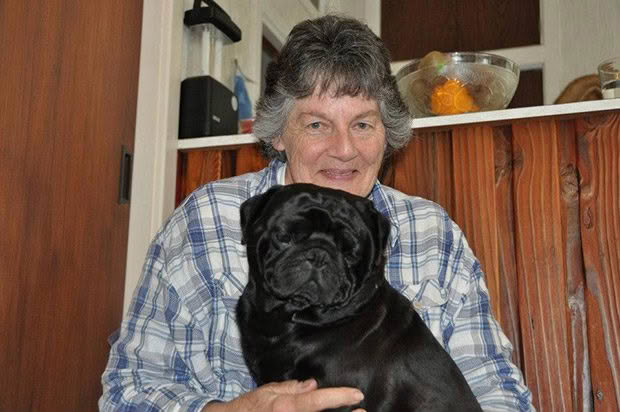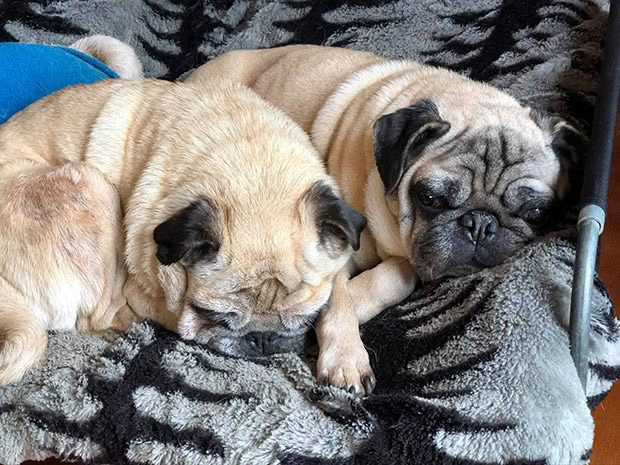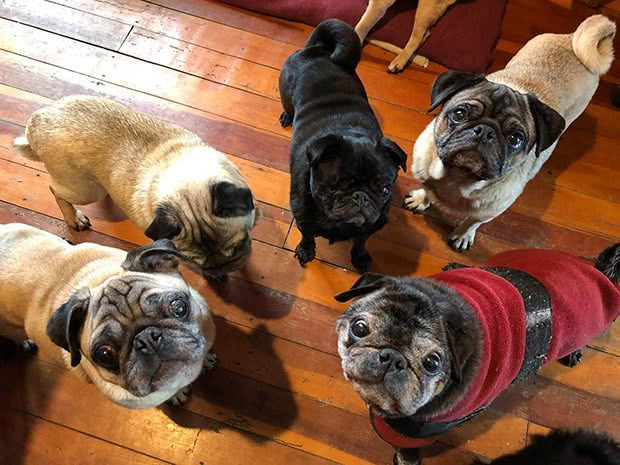Why this Rangitikei pug lover has been rescuing unwanted pugs since the 1990s

A long-time pug owner opens up her home — and heart — to give rescue dogs a happier, heathier life.
Words: Cari Johnson
Commotion greets Brenda Gordon each morning. Pugs weave between her legs as she bustles around the house and, by the time she sits down, there’s a pile in her lap.
“When I’m on the move, they are too. I can’t go anywhere without three to four pugs under my feet.”
Most of the 12 pugs living on her lifestyle block in Rangitikei are rescue dogs too old or sick to be adopted. Brenda, the coordinator of New Zealand Pug Rescue, has spent more than two decades re-homing pugs to give them the happy life they deserve.

“Some owners have no idea about the longer-term impact of having one. They just want a pug. If you’re going to purchase a car or appliance, you should do some homework. Pugs can go for $2000 to $3000, and an owner could have that same amount in pet bills in their first year,” she says.
Don’t be fooled by the antics of the pugs whizzing around her home — this dog-lover runs a tight ship. She rarely advertises pugs for adoption; instead, she carefully sifts through the applications on file to find the best match.
“People ask if I have any pugs and how much they are. I say, ‘Well, what kind of home do you offer?’ It’s not first-come, first-served. The welfare of the dog always comes first,” she says.

Brenda’s pooches warming up in the winter sunshine.
Brenda hopes to inform prospective owners before they commit. Like other flat-faced breeds, pugs can have health issues, including respiratory and skin problems, premature arthritis and autoimmune disorders. As companion dogs, they also thrive on constant affection. People who buy a dog on impulse (or from a disreputable breeder) may discover the pug isn’t suited for their lifestyle or budget.
Brenda understands more than most the joy a pug can bring to a household. She bought her first some 30 years ago to comfort her son at night. “He’d come out quite distressed, and I’d say, ‘Your dog will let you know if there’s anything out there.’ That pug gave him security.”
NZ Pug Rescue evolved out of her home in the 1990s. Pugs were becoming increasingly popular overseas when she, the then-secretary of the Wellington Pug Dog Club, started getting calls about pugs needing new homes. In 1999, the club established a fund to help her cope with food, vet bills and other incidentals for incoming pugs, “and it evolved from there”.

Her daily routine is dog-centric. Each day she strips dog beds, loads the washing and feeds the pugs before settling in for her own breakfast. Over her meal, she answers queries that come through the NZ Pug Rescue website. The rest of her day is similarly occupied. “It’s my life,”
she says.
That’s not to say she considers herself a sole operator, crediting the hundreds of people who make her work possible. In 2018, the Wellington Pug Grumble (a group of more than 300 pug owners) brought their pugs to the waterfront for the first annual Hug-A-Pug event to raise funds for Brenda’s rescue mission. Her vast network of trusted fellow dog rescuers allows her to check prospective homes (a requirement for adoption) throughout the country.

While her children left home decades ago, the dogs provide as much energy and personality as a houseful of kiddies. “It’s like having toddlers,” says Brenda. Their cheekiness keeps her entertained and uplifted when the going gets tough.
Even after a lifetime’s worth of pugs, Brenda still cries each time a dog is euthanised.
“Some people struggle to understand how I cope with it because each one breaks my heart. The day I stop crying is the day that I stop doing what I do. That would mean that I don’t care enough.”
TIPS ON BUYING A DOG

Do your homework. Brenda advises thorough research on individual breeds. Consider health issues, costs that may incur after purchase and whether the breed is a good fit for the owner’s lifestyle.
Choose a breeder wisely. Breeders registered with Dogs New Zealand adhere to a standard code of practice. “Make yourself familiar with that code and if a breeder doesn’t live up to it, contact Dogs New Zealand,” she says. Brenda also recommends using a purchase contract to protect
both parties.
Avoid impulse purchases. Brenda often re-homes pugs that were bought without long-term consideration. A dog’s life, says Brenda, is “a huge commitment”.
MORE HERE
Love this story? Subscribe now!
 This article first appeared in NZ Life & Leisure Magazine.
This article first appeared in NZ Life & Leisure Magazine.
